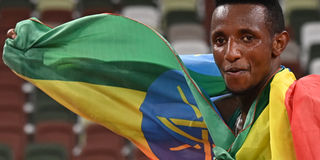Youngster Barega tears Kenya, Uganda strategies apart

Ethiopia's Selemon Barega celebrates after winning in the men's 10000m final during the Tokyo 2020 Olympic Games at the Olympic Stadium in Tokyo on July 30, 2021.
What you need to know:
- Ethiopia’s Selemon Barega checkmated an ill-advised Ugandan strategy that came a cropper under humid conditions at the Tokyo National Stadium Friday night
- While it rained for the Ugandans, it poured for Kenyans as the trio of Rogers Kwemoi (seventh in 27:50.06), Rhonex Kipruto (ninth in 27:52.78) and Weldon Langat (28:41.42 for 20th place) completely failed to challenge
- Both Cheptegei and Kiplimo have hinted at doubling up, meaning they could show up for the 5,000 metres whose Round One runs next Tuesday at 8pm local time
In Tokyo
Distance running at Olympic Games level is all about mind games.
Like chess, it’s brain, not so much brawn as misconstrued.
Like a seasoned grandmaster – and, at just 21, too race-intelligent for his age - Ethiopia’s Selemon Barega checkmated an ill-advised Ugandan strategy that came a cropper under humid conditions at the Tokyo National Stadium Friday night.
Time wasn’t of essence as Barega won in a relatively slow 27 minutes, 43.22 seconds, with Uganda’s pre-race favourites Joshua Cheptegei (27:43.63) and Jacob Kiplimo (27:43.88) settling for the minor medals.
And while it rained for the Ugandans, it poured for Kenyans as the trio of Rogers Kwemoi (seventh in 27:50.06), Rhonex Kipruto (ninth in 27:52.78) and Weldon Langat (28:41.42 for 20th place) completely failed to challenge.
They all blamed the Tokyo heat for their frustrations with Kwemoi saying back spasms coupled with a stomach upset put paid to his chances of challenging for gold.
Coming into the race the red-hot favourite, with a fresh world 10,000 metres record (26 minutes, 11 seconds) tucked under his belt, surely Uganda’s Joshua Cheptegei was always the red hot favourite.
Kissa sacrifised
The way he toyed with the clock at the Estadio de Atletismo de Turia in Valencia on October 7 last year during his wavelight-paced world record, it was deemed Cheptegei’s race to lose.
But the 24-year-old triple world record holder (5km on the road, 5,000m, 10,000m) replaced the wavelights with Stephen Kissa in a strategy that, on the contrary, dimmed his gold medal hopes.
With a pace faster than the wavelights of Valencia, Kissa opened up a gap on the frontrunners after just 1,000 metres. His splits: 1,000m (2:43.93), 2,000m (5:34.79), 3,000m (8:22.91), 4,000m (11:14.00), 5,000m (14:08.56) and 6,000m (16:58.63).
The suicidal burst, weird in a championship race, eventually claimed him, forcing him to drop out of the race. Dejected.
“It was a sacrifice for the team,” he sought to explain.
“We had a plan for me to go ahead to make it a fast race. I thought they were going to follow me but when I looked round they were not there.
"My teammates Cheptegei (silver medal) and Jacob Kiplimo (bronze) stayed behind. They couldn't do it.
"We were planning for the gold but unfortunately we have a silver and bronze. But I'm happy. We have two medals.”
Bitter after being sacrificed on Cheptegei’s alter, Kissa now wants his countrymen to return the favour.
It’s payback time.
"Maybe next time someone else will sacrifice themselves for me,” he charged, visibly angered by the botched strategy.
Nagging injury
In mitigation, Cheptegei said he wasn’t at ease with a nagging tendon injury.
“I realised that today we were not going to run fast because it was really untypically humid and tough. I had to relax. To run faster in these conditions is really challenging,” Cheptegei said.
“In the first 1km, I saw that it was really too humid and too hot and I was saying that I need to reserve my energy for the last laps.”
The world record holder described his silver as a bitter-sweet reward.
“I have two feelings. One is that I'm very happy to have won an Olympic silver medal today and I would say that this is really special for me as a world-record holder and as a world champion.
“But the other side of me is really not satisfied with the result because I came here expecting to win a gold, but you never know how someone has prepared and you just have to be grateful and thankful to God that you had the best opportunity of being on the podium."
Cheptegei’s strategy was to bid his time and attack in the last three laps.
“But still I was not really feeling comfortable with my tendon, and I was just saying that maybe I need to consider health first rather than to break myself and go out for a long time.
"I was feeling that I just need to follow the pace, not to attack early.
"Also I was saying that if I keep it to the last sprint, I might even lose it. So it was really difficult for me and different."
Both Cheptegei and Kiplimo have hinted at doubling up, meaning they could show up for the 5,000 metres whose Round One runs next Tuesday at 8pm local time.
Whether or not they will sacrifice 19-year-old Oscar Chelimo, like they did Kissa, remains to be seen.
For now, the men from Kapchorwa will celebrate their minor medals as Barega joins the exclusive league of Miruts Yifter, Million Wolde and Kenenisa Bekele as Ethiopia’s Olympic Games 10,000m champions, and taking over from legendary Brit Mo Farah as Olympic title holder over the distance.




